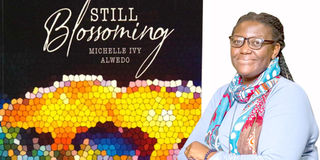Alwedo poetry collection displays the fight in her

Michelle Ivy Alwedo is pushing her poetry. PHOTO/net
What you need to know:
History. Sometimes, the poet seems to say, contentment comes from letting go and learning how to forget what one cannot change by remembering to correct what can be altered in our lives.
Michelle Ivy Alwedo’s poetry collection titled Still Blossoming is a happy blend of confessional verse and rhapsodic self-acceptance. Accordingly, it somewhat recalls the 1951 poem by Dylan Thomas titled “Do not go gentle into that good night”.
That said, while Thomas’s poem was about death, Alwedo’s poems have the fighting spirit which indicates an indomitable will towards personal growth.
True, we may not always be sure that we know the speaker of each poem. But we can be sure of the personal sincerity by which each adjective, noun, verb or gerund is set to the music of the poet’s way with words. It has sections, beginning with Where Do Broken Dreams Go To Die which is a little dark, if tenebrous.
Wolf In The Hedge has the speaker of the poem as the wolf addressing a girl.
“Silly, silly little girl/High on hope’s deceit/Dazed in a daydream/Smiling wide/Doped up with/Childlike glee,” the first stanza reads.
The wolf views the girl as out of touch with reality. See, the 17th century English Philosopher Thomas Hobbes had told us in his groundbreaking book Leviathan (1660) that: “Man’s life was solitary, poor, nasty, brutish and short.” And the poet seems to agree.
Again, Hobbes revealed how life was one big anticlimax largely thanks to people being naturally selfish, wicked and untrustworthy. As a consequence, the primitive or “natural” state of humanity is bleak.
Indeed, this is depressing and serves the wider context in which this particular poem inheres. There is nothing happy-go-lucky about this context, beclouded by humankind’s seemingly native need to self-immolate.
The wolf, one might say, is actually life speaking to the childlike girl and telling her that all her hope will ultimately dissolve in tears. It is only a matter of time. The young girl could just as easily be the poet herself, on the precipice of a paradise lost.
Suicidal Ideation, also in this section, further carries this darkness to the light of the reader’s attention.
“as if it is not I/hostage to her residence in my mind/as if it is not I/captive to her trembling fear,” the poet writes.
In the idiom of American poet Edward Estlin Cummings, who was also known as EE Cummings, Alwedo uses only lower case wordings. This writing style might be used to highlight a life that is not being lived out loud, or capitalised by a life being lived to the full.
No, this is a small existence. It is marked by fear and a “deceitful desire for death.”
Yes, it is deceitful because it is not representative of the speaker’s true self, which would be exhibited by an absence of fear.
Again, the desire for death is a lie here because it will not deliver the speaker from the ruins of a life unfulfilled. Instead, it will cause the destruction of a life which could’ve been fulfilled, if only given the chance.
To be sure, suicidal ideation, or suicidal thoughts, will put paid to any chance of happiness as it hijacks the mind from thoughts of bliss which often presage a life of happiness.
The second section of this collection reads better in terms of our collective aspirations for a better day. Entitled What Does Love Look Like To Me, the poem Oath to self in this section points to self-discovery—a sure-fire way to a better life, and self-redemption.
“in delicate/dew/droplets/dancing/down/as dawn inhales earth’s mourning/washing over with amnesic contentment,” the poet writes.
Although still in lower case, the wording implies a rising, Phoenix-like, from the emotional rubble that has buried the poet in despair earlier on in this collection.
Sometimes, the poet seems to say, contentment comes from letting go and learning how to forget what one cannot change by remembering to correct what can be altered in our lives.
Airport Exit, found in the same section, speaks of a quasi-encounter with a stranger. It is an encounter which is not consummated, if you please, because it does not blossom into anything more than eye contact.
“It was not meant to be pursued/Not mean to be tainted/By greed or need for more./So, with a painted smile/I closed the tinted widow/Afraid of my selfish desires/Even more so by the glint of hope in his eyes,” the poet says.
Two strangers might have fallen in love, if they went beyond being strangers. However, the poet is still sceptical when it comes to love and hopes to preserve the memory of the stranger’s smile, unspoiled by an actual meeting.
Ergo, there will not be any betrayal or unrequited love when love is not pursued but recessed to the margins of a life settled at the sidelines.
In the last section of this collection, entitled Still Blossoming, Hedera, we see the poet coming of age and declaring “I Am”. Here, the poet boldly proclaims who she is and also, like Wole Soyinka’s Tiger, she pounces on it with a bubbly self-regard revealing her tigritude. At this point, we see that the poet is blossoming and it is a beauty to behold.
Book Title: Still Blossoming
Author: Michelle Ivy Alwedo
Year of Publication: 2022
Pages: 77
Price: Shs30,000
Where: Uganda Museum Library




